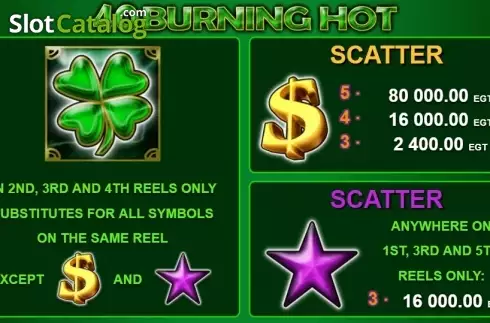40 Burning Hot Demo

A burning sensation around the vaginal area is a relatively common complaint. There are many different causes of vaginal burning, including irritants, sexually transmitted diseases, and menopause. The 40 Burning Hot video slot is a five-reel game that uses an extended 4x5 layout, making this a slightly bigger play area than previous entries in this series. The reasoning for that is easy to figure out from the game's name: this machine will have 40 paylines for players to win on, way up from the five in the original (and double the 20 in the other new edition that the company is also working on). 100% Welcome Bonus for the first deposit! When activated, you can play on the bonus balance. After wagering, the entire amount from the bonus balance will be transferred to the main one.
The intentional burning of facilities, including buildings burned for fire training, is considered to be a demolition under federal asbestos regulations. That is true even if no asbestos is present in the structure.
40 Burning Hot 6. 100 Burning Hot. 5 Burning Heart. 10 Burning Heart. 20 Burning Dice. 20 Dazzling Hot.
40 Burning Hot Demo
- before burning, a thorough inspection of the structure (or the portion of the structure to be burned) for the presence of asbestos
- removal of all regulated asbestos-containing material, including Category I and Category II nonfriable ACM, before the fire, or fire training, if the activity will disturb those materials in any way
- timely advance notification of appropriate authorities about the planned burning (even before any asbestos is removed, and even if no asbestos is present in the structure)
- See also A Guide to Normal Demolition Practices Under the Asbestos NESHAP (EPA-340/1-92-013) for definitions of Category I and II nonfriable ACM
Fire training exercises may also be subject to state and local government requirements, including a permit requirement. Contact the appropriate state and local environmental agencies when you plan a fire training exercise. See State demolition information to help you identify the state and local government agency requirements about open burning. Not all agencies publish this information on a website, so you may need to contact them directly.
- All open burning must be conducted in accordance with federal and state regulations.
- Open burning of buildings must be done in a manner that complies with all applicable requirements of the State Implementation Plan approved or promulgated by the Administrator of EPA pursuant to Section 110 of the Clean Air Act. Learn more about State Implementation Plans.
Before you open burn a building, you should check with the appropriate authorities about federal, state or local asbestos regulations that may apply to the activity.
There may be no applicable regulations that cover the type of open burning of a building that you are planning. Or the regulations may not address every aspect of the open burning issue. In such instances, best practices should be used when open burning so that it is done in a manner that protects public health and the environment.
40 Burning Hot Demo Video
- No materials suspected to contain asbestos, or which contain asbestos, should be burned at debris management sites.
Open burning can provoke strong public reaction, even when it's done in a legal and environmentally responsible manner. Consider providing people who live in the area where the open burning will take place ample advance opportunity for public notice and input.
Some people may be more vulnerable to the impact of smoke. Their health may be adversely affected even when open burning is done in accordance with all applicable regulations.

- land clearing debris,
- diseased trees
- and debris from emergency clean-up operations.